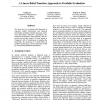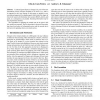1080 search results - page 14 / 216 » The Complexity of Belief Update |
UAI
2003
15 years 1 months ago
2003
We show how to use linear belief functions to represent market information and financial knowledge, including complete ignorance, statistical observations, subjective speculations...
ECAI
2008
Springer
15 years 1 months ago
2008
Springer
A rational agent adopts (or changes) its goals when new information (beliefs) becomes available or its desires (e.g., tasks it is supposed to carry out) change. In this paper we pr...
ECSQARU
2009
Springer
15 years 6 months ago
2009
Springer
Partially preordered belief bases are very convenient for an efficient representation of incomplete knowledge. They offer flexibility and avoid to compare unrelated pieces of inf...
SIGMOD
2010
ACM
14 years 12 months ago
2010
ACM
In massively collaborative projects such as scientific or community databases, users often need to agree or disagree on the content of individual data items. On the other hand, tr...
AAAI
2012
13 years 2 months ago
2012
It has been shown recently that the complexity of belief tracking in deterministic conformant and contingent planning is exponential in a width parameter that is often bounded and...


